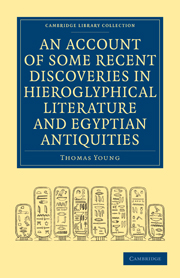 An Account of Some Recent Discoveries in Hieroglyphical Literature and Egyptian Antiquities
An Account of Some Recent Discoveries in Hieroglyphical Literature and Egyptian Antiquities Book contents
- Frontmatter
- Contents
- PREFACE
- WORKS OF THE AUTHOR
- CHAPTER I Introductory Sketch of the Prevalent Opinions respecting Hieroglyphics
- CHAPTER II Investigations founded on the Pillar of Rosetta
- CHAPTER III Additional Inferences, deduced from the Egyptian Manuscripts, and from other Monuments
- CHAPTER IV Collections of the French.—Mr. Drovetti.—Mr. Champollion's Discoveries
- CHAPTER V Illustrations of the Manuscripts brought from Egypt by Mr. Grey
- CHAPTER VI Extracts from Diodorus and Herodotus; relating to Mummies
- CHAPTER VII Extracts from Strabo; Alphabet of Champollion; Hieroglyphical and Enchorial Names
- CHAPTER VIII Chronological History of the Ptolemies, extracted from various Authors
- APPENDIX I Greek text of the Manuscripts and Registries
- APPENDIX II Specimens of Hieroglyphics
CHAPTER VI - Extracts from Diodorus and Herodotus; relating to Mummies
Published online by Cambridge University Press: 01 March 2011
- Frontmatter
- Contents
- PREFACE
- WORKS OF THE AUTHOR
- CHAPTER I Introductory Sketch of the Prevalent Opinions respecting Hieroglyphics
- CHAPTER II Investigations founded on the Pillar of Rosetta
- CHAPTER III Additional Inferences, deduced from the Egyptian Manuscripts, and from other Monuments
- CHAPTER IV Collections of the French.—Mr. Drovetti.—Mr. Champollion's Discoveries
- CHAPTER V Illustrations of the Manuscripts brought from Egypt by Mr. Grey
- CHAPTER VI Extracts from Diodorus and Herodotus; relating to Mummies
- CHAPTER VII Extracts from Strabo; Alphabet of Champollion; Hieroglyphical and Enchorial Names
- CHAPTER VIII Chronological History of the Ptolemies, extracted from various Authors
- APPENDIX I Greek text of the Manuscripts and Registries
- APPENDIX II Specimens of Hieroglyphics
Summary
IT is rather as being illustrated by the discovery of Mr. Grey's Greek papyrus, than as contributing much to its illustration, that I shall here introduce such passages of Diodorus Siculus and of Herodotus, as tend to explain the customs of the Egyptians respecting the honours shown to the dead bodies of their relations.
“The inhabitants of this country,” says Diodorus, Book I. § 51, Wess., in the language of Booth, p. 26, “little value the short time of this present life; but put a high esteem upon the name and reputation of a virtuous life after death; and they call the houses of the living, Inns, because they stay in them but a little while; but the sepulchers of the dead they call Everlasting habitations, because they abide in the graves to infinite generations. Therefore they are not very curious in the building of their houses; but in beautifying their sepulchres they leave nothing undone that [the excess of magnificence can suggest].”
§. 72. W. “What the Egyptians performed, after the deaths of every one of their kings, clearly evidences the great love they bore to them. For honour done to him that cannot possibly know it, in a grateful return of a former benefit, carries along with it a testimony of sincerity, without the least colour of dissimulation.” Booth, p. 37.
- Type
- Chapter
- Information
- An Account of Some Recent Discoveries in Hieroglyphical Literature and Egyptian AntiquitiesIncluding the Author's Original Alphabet, as Extended by Mr. Champollion, with a Translation of Five Unpublished Greek and Egyptian Manuscripts, pp. 87 - 115Publisher: Cambridge University PressPrint publication year: 2010First published in: 1823


